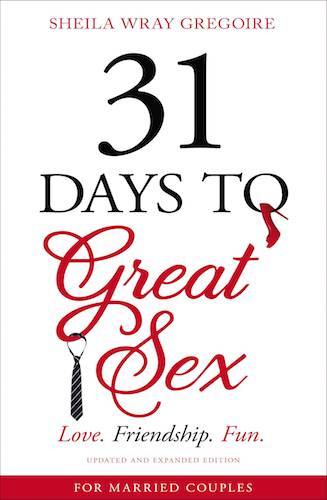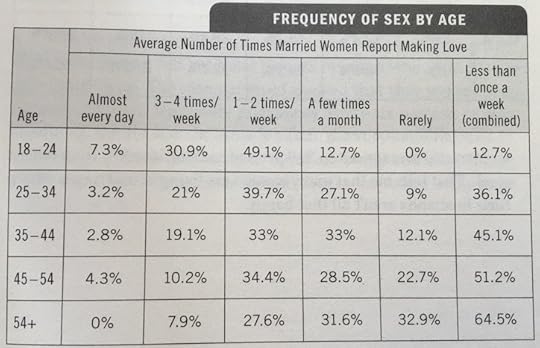Sheila Wray Gregoire's Blog, page 49
September 16, 2020
10 Questions to Ask if Your Wife Doesn’t Want Sex
Are the higher drive husband, and you’re wondering what to do because your wife rarely wants sex?
We opened the week looking at frequency of sex in marriage. Usually marriages start off with couples having sex relatively frequently (like at least several times a week).
(If yours didn’t, then that really is a sign that something major is going on, and you should see a licensed counselor).
But then, just as frequently, couples see a drop off in frequency. Sometimes it’s not a big deal, but sometimes, even over a period of years, that drop off becomes drastic.
In this post, I’m addressing marriages where the drop off is huge–and sex is happening less than once a week.
Next week we’ll look at high drive spouses where sex is actually happening a healthy amount of time (as we looked at on Monday), but today, I want to focus this on high drive husbands who are having sex a few times a month or less. (We’ll talk to wives on Friday)
So let’s get started!
An uncomfortable truth: Drastic drop-offs in frequency of sex rarely happen in isolation.
When we surveyed 20,000 women last winter for our upcoming book The Great Sex Rescue, we found that 73% of truly sexless marriages had at least two of these problems:
Porn use
Male sexual dysfunction
Anorgasmia (not reaching orgasm)
Vaginismus
Not feeling close during sex
I’m going to assume that for you the issue is not male sexual dysfunction, since if it were, this isn’t the post that you’d be reading.
Now, what about marriages where sex was just infrequent, but not technically sexless? These things were still far more likely to be true than in marriages where sex was happening frequently.
Please hear me on this one: I am not saying that this is necessarily your fault. If the majority of marriages do things because of X, you could still be in the minority who look more like Y. And when it comes to sexual pain, you’re not responsible for that (although you are responsible for how you handled it). In many cases when she doesn’t feel pleasure, too, the problem is more that she won’t let herself relax and explore what feels good because of things that she’s believing. You’d love to give her pleasure, but she’s not willing.
(And we’ll be addressing a lot of this in our Orgasm Course launching next month! Make sure you’re signed up to the email list to be notified when it’s available, and so you don’t miss the launch sale!).
That being said, it does very little good to tell you that it’s all your spouse’s fault, and you’re justified in being angry and hurt. That only leaves you stuck, and I want to see you move forward.
Yesterday I addressed what the lower drive spouse can do to help the situation, and today I’d like to ask you to take an honest look at what has happened in your marriage and sex life, to see if there are steps you can take to bridge the gap.
Questions for Higher Drive Spouses to Ask Themselves
These may be hard questions to hear, but please, pray now, before you read them, and ask, “God, if any of these relate to me, please soften my heart so I can hear it.”
1. Early in your marriage, did you express frustration, anger, or criticism that your wife wasn’t enjoying sex as much as you were?
For most women, orgasm is a learned behaviour; it isn’t something that automatically happens with intercourse.
If you were critical or angry that your wife didn’t enjoy sex the way that you did, or were frustrated that she couldn’t orgasm or couldn’t get aroused, it’s quite likely that she now equates sex with something she’s not good at. Most women already have body image issues; she likely now feels, “I’m broken.”
Even if you don’t feel that you were angry at her, if you were internally focused on your own disappointment rather than helping her experience great sex, she likely picked up on that.
Or if, when she did have sex and enjoyed it, you’d also complain and criticize that you weren’t doing it more, she would have internalized the message, “nothing I do will ever be enough.” Then sex, which she was enjoying, became something that still made her feel inadequate.
2. Did you take time to ensure that your wife felt pleasure?
When you were just getting used to intercourse, was her pleasure your focus, or was it your own? Did you slow down so that you could figure out what would arouse her, or did you think that she should be aroused by the same things that arouse you, and so figure that she should “catch up” to you?
If you had sex for months, or even years, without her experiencing pleasure or an orgasm, you may need to apologize and ask for forgiveness.
Maybe you wanted her to feel good, but she had too many hang-ups or she wasn’t comfortable with you trying to touch her. Even then, to go ahead when she’s not enjoying herself is to solidify in her mind, “sex is not for me.”
It’s better to sit down early and talk about how God made sex to feel passionate and amazing for both of you, and go through a challenge like 31 Days to Great Sex, which can help her step-by-step discover how her body works, without it being overwhelming.
You may also enjoy:
The theology of the clitoris
The theology of the penis
The theology of sex podcast
How to see sex from a woman’s point of view
3. Have you expressed frustration when she is experiencing physical issues making sex uncomfortable?
Up to 7% of evangelical Christian women experience sexual pain to the point that penetration is impossible, and many others experience vaginismus or other kinds of dyspareunia (sexual pain) where penetration may technically be possible, but is very, very uncomfortable.
If your wife experienced pain, did you insist on trying to have intercourse anyway? Did you talk about how disappointed you were that you couldn’t have sex, to the point that she pushed herself to go through with it because she felt so embarrassed and broken and guilty, or did you show her acceptance and love and reassurance?
After having a baby, women can experience sexual pain, even if sex was easy beforehand. If that was your wife’s story, were you patient as she healed, or did you pressure her to have sex regardless?
Perhaps it’s not sexual pain, but pain overall. If your wife has had heavy periods so that she’s experienced a lot of cramping or very heavy bleeding, did you express sexual frustration to her, rather than compassion for what she is experiencing? Did you prioritize your own sexual frustration over her physical discomfort? I know that many Christian books talk about men’s sexual discomfort as if it’s very difficult to go more than 72 hours, and women shouldn’t make their husbands wait. But this isn’t God’s view (as we see from Old Testament laws about periods).
When women feel as if their physical experience isn’t important, then sex is no longer a mutual experience. It’s only about being used. That can easily turn a woman off.
4. Was sex, when you had it, depersonalizing?
Many high drive spouses say that they feel most intimate with their spouse, and closest to their spouse, when they have sex.
This doesn’t always mean, though, that they are going about intimacy or sex in the way that will build intimacy. Sometimes we swap intimacy with sex, and we actually debase both.
If you’ve used pornography extensively, then you’ve learned that sex is about using someone, not about “knowing” someone. In porn, sex is about a man getting his needs met by using another person, often violently. Most of the sex acts that are depicted are done in such a way as to provide maximum humiliation to the woman, and maximum power to the man.
If you have grown up masturbating to pornography, you have trained your brain to become aroused by things that make you feel powerful at the expense of another person. It’s almost inevitable that you will bring part of that into the bedroom.
Maybe you’ve been pressuring your wife to do things that she is not comfortable doing and that don’t feel intimate. And maybe you’ve expressed disappointment that she won’t try things, as if she doesn’t love you because she won’t give these things to you that you want.
Or maybe it’s not to that level. All of us, in the Western world, grow up in a pornographic culture, whether or not we’ve watched porn. And what becomes sexy is what is depersonalized. “Taking” someone is sexier than just loving someone. Sex has been divorced from marriage in our culture, so that it’s become all about the body, and not about the heart.
If you haven’t been able to say “I love you” or say your spouse’s name during sex, but instead tend to use very coarse language that your spouse doesn’t like, or even “check out” during intercourse so that it’s obvious you’re not really thinking about your wife, then sex may become something very ugly in your relationship. Here’s how one commenter described it:
Sorry if this seems crass, but there’s no better way to put it in the English language in my opinion. My husband is very good at f***ing me. It’s something he’s seen modelled to him through porn for years. It’s physical, it’s animalistic, it’s a release during which he says stuff like “you’re so hot” etc. It’s focused on the here and now… on the bodies present. He feels loved during that experience because he’s experiencing the highs of arousal and orgasm in my presence while also enjoying my body. Because he’s doing that to me in my presence, he thinks that means it’s him showing me his love. I understand why he thinks what he’s feeling is enough and is love/loving me. But 99% of our sexual encounters don’t go much beyond that. The exchange is purely physical.
16% of our survey takers said their primary emotion after having sex is feeling used. If your wife could have written that, it’s likely that she’s one of the 16%.
5. Have you broken trust with your wife?
If your wife has found you using pornography, or knows of a long-standing porn issue, then you have broken trust with her. So many women on this blog comment that they are now turned off of sex, because they can’t trust that their husbands actually want THEM, or that their husbands are thinking of THEM.
If you have had an affair, or had an emotional affair, even if it was in the past, if you have not taken time to admit the depth of hurt that you have caused, and rebuilt trust, then she may still be withdrawing. It’s very difficult to want sex when trust isn’t there.
6. Did you use the Bible to pressure her into having more sex?
Did you talk about the “do not deprive” verses from 1 Corinthians 7:3-5, and tell her that she was in sin by not having sex more? Did you tell her that you find it much harder to resist porn or resist lusting if you don’t have sex frequently (after all, Every Man’s Battle actually says that women are men’s methadone)? Did you tell her that if she doesn’t give you sex, or sexual favors during her period, that you would lust, because the Bible says that without sex we’ll be tempted?
We found in our survey that certain teachings very prevalent in the evangelical world cause women’s libidos to plummet and women’s orgasm rates to plummet. “Have sex so he won’t lust!” and “You’re obligated to have sex with your husband” are two such teachings, and there are many more. (we’ll tell you the exact numbers, plus so much more, in our upcoming book The Great Sex Rescue, out March 2021!)
The Bible clearly says that sexual intimacy is a vital part of a healthy marriage, but sexual intimacy does not just mean intercourse. It means sexual activity that is mutual, pleasurable, and intimate. Pressuring someone repeatedly using Scripture is actually a form of spiritual abuse and coercion; it is not a proper use of Scripture.
We should allow Scripture to point out where we need to change to love somebody more effectively, not distort Scripture to get our own needs met. That’s going against the very nature of Christ, who said, “For the Son of man did not come to be served, but to serve, and to give His life as a ransom for many.” (Matthew 20:28).
7. Do you care for your health and hygiene?
I know this is a tricky one to deal with, but excess weight plays a major issue when it comes to sex. It is difficult to have pleasurable sex when a man has a big belly. Excess weight impacts “usable length” of the penis, and prevents his pelvic bone coming into contact with her clitoris during thrusting, reducing her ability to feel pleasure. It can also make the man-on-top positions impossible (due to feeling as if she’s being suffocated), but many women have said that straddling their very large husband is also too physically straining.
Every time I write about hygiene, too, the comment floodgates open. It seems that many women are embarrassed to tell their husbands, “your breath stinks”, or “you need to have a shower”, because it seems rude, so they avoid sex instead. Other women do tell their husbands, but don’t get the desired behaviour.
Do you shower everyday? If you work at a physical job, do you shower before coming to bed? Do you brush your teeth before coming to bed?
8. Do you share the load with your wife?
If your wife is run off of her feet caring for the family, while you get a lot of downtime during the day or in the evening, then she could simply be exhausted and feel very taken for granted. If she carries most of the mental load for the family, so that she has so many things running through her head and she can never “turn off”, then maybe she’s always turned off sexually because there’s no room in her brain for sex!
I talked about this phenomenon in our June series on mental load and emotional labor, and so, so many women told me that THIS was the #1 reason that they had no libido. If their husbands could take on some of the mental load of the family, it could change everything.
If you didn’t read that series, please check it out. And ask your wife to work through it with you.
9. Do you show your wife love OUTSIDE the bedroom?
Does your wife feel loved, cherished, and valued outside the bedroom? Are you only nice when you get sex, and do you act disappointed and withhold affection if you don’t?
Is the only time you touch her or kiss her when you want to have sex? Do you grope her when she’s doing the dishes or other things, rather than show her affection in a way that she’d prefer that would honor her? Almost 20% of our respondents say their primary motivation for having sex is that their husbands treat them badly if they don’t have sex. Over time, that wears on a woman.
You may also enjoy:
10 Reasons Your Wife Doesn’t Want Sex
10 Sexy Questions to Ask Your Wife (to warm her up)
10 Ways to Initiate Sex with Your Wife without Turning Her Off
10. Do you open up to your spouse emotionally?
For women, sex is very physically vulnerable. You’re literally letting someone inside your body.
As we talked about in the podcast last week, many men who have a difficult time opening up emotionally prefer to have sex to connect. But sex is not a substitute for emotional vulnerability.
I know this is a bit of a chicken and egg thing–how can you open up to her when you feel rejected sexually by her? Why should you have to be the first one to make the move?
But again, we’re talking about trying to fix the problem, and to fix it, you can only change yourself and how you react; you can’t change her. She will not want to make love to someone that doesn’t listen to her emotions or share his own emotions. Likely she wants to actually connect and feel “known”, and that isn’t just a physical experience. It’s everything all wound up together. If you’ve had a hard time emotionally connecting with her, take a look at my post on 10 questions to build your emotional connection from last Friday, because I’ve got those questions, and some other great tips, in there to help you. Plus try my emotional reconnection course!
What if you see yourself in some of these high-drive husband questions?
Take some time to pray through them and ask God to show you how you have hurt your wife or given her a bad view of sex. If you can relate to some of these, you haven’t just pushed your wife away; you’ve also stolen the sex life that she was supposed to have from her. You have tainted sex to her, and that has hurt her. Allow yourself to feel the pain that she has felt–even if she has caused you pain, too. Focus on what you have done.
Then I’d suggest writing her a letter, because we can often think better if we write it all down.
List what you have done. Tell her how you think this must have made her feel. And apologize for each thing.
If you can remember specific instances when you did any of these things, name those instances. Say, “I remember our anniversary two years ago when we were having sex, and I was using really bad language. You asked me to stop, and I didn’t. Afterwards I knew you were upset, but I couldn’t handle it, so I didn’t say anything. I let you go to sleep feeling used, and I’m sorry.”
Ask her to forgive you. Tell her that you know that it may take her a while to trust you again. If the issue is porn use, show her that you are serious by joining a recovery group, confessing to a close friend to hold you accountable, and sharing your passwords with her.
To rebuild, tell her that you want to focus on her, not on you. Suggest trying something like 31 Days to Great Sex which can be focused on how she feels about sex, and learning how to make it personal and pleasurable for her. Tell her you want her to be the focus from now on.
Feeling sexually disconnected?

Like you’ve lost your groove?
Like you’re on two different planets when it comes to sex in your marriage?
31 Days to Great Sex can help you talk through what’s gone wrong and try some new things to figure out how to make it RIGHT!
Let's try it!
What if you don’t see yourself in these high-drive husband questions?
In some ways, that’s awesome. It means that you likely don’t have things you need to repair; that you are a selfless husband who is loving his wife.
In other ways, it’s tough. If you did something to contribute to the problem, then you can also do something to contribute to solving it. But if this really wasn’t you, then you’re in a tough spot.
Please, one warning, though: only 7% of women in sexless marriages report having none of porn use; anorgasmia; pain during sex; not feeling close during sex; and male sexual dysfunction. Really make sure they aren’t true in your life!
Now, that being said, what do you do when you didn’t cause this?
Make sure that there aren’t other issues going on, such as your wife feeling really stressed for other reasons; health issues; issues with the kids; etc. Do what you can to smooth these issues out.
Then say to your wife, “I know we were meant for more. I want us to experience real passion and intimacy, but you are continually pushing me away. That makes me not just sad. It makes me rejected, lonely, and in despair. I don’t want to live in a marriage like this, and I believe that we have to do something about it. We’re missing out on so much. I know sex doesn’t matter much to you, but I’d like to figure out how to show you what all the fuss is about. Can we please try?”
And if that doesn’t work, if it really is that she simply doesn’t like sex and doesn’t prioritize sex, then I’d advise talking to a licensed counselor. If she won’t go, go by yourself. A counselor can often help you see what’s really going on, and make a plan for how to address it.

Women reading this–do any of those questions ring especially true for you? And everybody–how would you repair if some of those questions did apply to you? Let’s talk in the comments!
The Libido Differences Series:
Can Higher Drive Spouses Be Content with their Sex Lives?
How Many Times a Week Should Couples Have Sex?
A Word to Low Libido Spouses
10 Questions for High Libido Husbands to Ask if Their Wives Don't Want Sex
The Frequency Podcast (what our survey told us about sex frequency) (September 17)
7 Questions for Wives to Ask if Their Husbands Don't Want Sex (September 18)
How to Handle Rejection When Your Spouse Doesn't Want Sex (September 21)
10 Things that Tank Women's Libidos (September 28)

Sheila Wray Gregoire
Founder of To Love, Honor and Vacuum
Sheila has been married to Keith for 28 years, and happily married for 25! (It took a while to adjust). She’s also an award-winning author of 8 books, including The Good Girl’s Guide to Great Sex, and a sought-after speaker. With her humorous, no-nonsense approach, Sheila is passionate about changing the evangelical conversation about sex and marriage to line up with kingdom principles. ENTJ, straight 8
FacebookTwitter
Related Posts
THE LIBIDO SERIES: Can High Drive Spouses Be Content with Their Sex Lives?
Sep 8, 2020 | 71 Comments
If you want sex more often than your spouse, are you doomed to have a disappointing sex life? It's...
The “How NOT to Flirt with Your Wife” Podcast
Aug 27, 2020 | 11 Comments
It's the last Thursday of the month, so it's time for our Start Your Engines podcast, directed...
The PERIOD Series: What Do You Do About Sex During Your Period?
Aug 17, 2020 | 50 Comments
Do you have sex during your period? Or is sex during your period off of the table? We're in the...
Should Doing Housework Be Considered Foreplay?
Jun 9, 2020 | 29 Comments
Have you all heard "sex begins in the kitchen"--not meaning that we should do interesting things...
Start Your Engines Podcast: How Do We Have a Pressure-Free Sex Life?
Apr 30, 2020 | 23 Comments
How does sex become pressure-free when you really do want it? It's the last Thursday of the month,...
Is Sex Physically Vulnerable to Men?
Apr 28, 2020 | 34 Comments
We know that sex is vulnerable to women. But is it vulnerable to men, too? I received this reader...
A Word to Low Libido Spouses
Sep 15, 2020 | 41 Comments
Many, if not most, of my readers are low-libido spouses. Sex just isn't the biggest need you have,...
The LIBIDO SERIES: How Much Sex Should You Have Every Week?
Sep 14, 2020 | 20 Comments
When it comes to sex, how much is enough in a marraige? How often should you make love? We're in...
September 15, 2020
A Word to Low Libido Spouses
Many, if not most, of my readers are low-libido spouses.
Sex just isn’t the biggest need you have, and quite frankly, most nights you could do without it.
I get it. I’ve been the lower libido spouse for most of my marriage (it does go up and down, though!)
Today I have a few things that I’d like to say, as we’re talking this week about what a healthy frequency of sex is in marriage.
When your spouse married you, your spouse trusted you with something that was very near and dear to their heart.
Your spouse trusted you with sex.
Assuming your spouse is healthy and your marriage is healthy, your spouse wants to make love with you, to connect with you, to experience real oneness with you. Your spouse wants to be passionate the way that God made us to be passionate.
But there’s a problem. You’re the one who holds the key.
You’ve become the gatekeeper.
It’s not fair, I know, but the person who wants something the least always ends up setting the terms for the relationship. When you’re dating, the person who is least invested decides how often they see each other, text each other, talk to each other. The person who is more invested sits by the phone, waiting for notifications to pop up.
Was that ever you? If so, you remember that it’s a lonely place to be.
Well, we create a similar dynamic with sex in marriage. Assuming there is no coercion on the higher drive spouse’s part, then the person who decides how frequently you make love is the lower drive spouse.
And that puts your spouse entirely at your mercy.
Some people are being coerced into sex. If you’re wondering if that’s you, these posts may help:
Let’s talk marital rape
The marital rape and obligation sex podcast
10 times you’re allowed to say no to sex
Sometimes the low libido spouse doesn’t understand how much sexual rejection hurts.
Because you don’t experience intimacy and love and connection through sex in the same way, it feels strange to you, and maybe even a little pathetic, that your spouse feels so rejected and hurt when you don’t have sex. But please listen to these people’s stories:
Other than my children, my life is RUINED. I have little to no friends (why have friends you can’t confide in?) I don’t trust anyone (If I can’t trust my wife, who can I trust?), I avoid, both physically and socially, any woman because I can’t even trust MYSELF to not to something stupid, because I still believe I made an oath I need to keep. I can’t look my family in the face, feeling like a failure. My work is in shambles, because I feel worthless, have no ambition or drive, and most time feel whats the point? I don’t trust churches/preachers, because all I hear about is how evil men are, and if we were just better men things would be hunky-dorey, and never anything about women. I don’t even trust GOD anymore: why should I? He has never helped me at all, not once.
Most days I just want to end as quickly as possible, and most nights as I sit in the dark untouched, unloved, unwanted, I just want to die – but then I’m too much of a coward to do that, so there is no escape there.
But you want to know the sad part? I have told my wife, in counseling, exactly everything above. Result: “Thats not my problem.”
A lonely commenter
"Women: Do We Understand What rejection does to husbands?"
For [higher drive spouses], it’s not about the physical. It’s about a deep emotional connection that I share with one person. The pain of being emotionally rejected is so very real. It’s hard because we are effectively told to “shut up and be content” simply because our meaningful connection includes something physical. No amount of talking will ever truly take the place of sex. In fact, talking and then ending the night without sex, is one of the hardest things to face. My husband gets his emotional needs met and considers it good, while I have to figure out how to walk away from my emotional needs because it includes sex. I have had to literally teach myself to shut down any sexual drive, and the emotional connection it brings, and walk away from it entirely. Sex is on his terms. I’ve never felt so distant from my husband, despite the hours of conversations we’ve had (we are both big talkers).
A frustrated wife
Podcast: Are Sex and Talking Equivalent?
I know that you want a close and intimate marriage. We all do!
But you can’t have a close and intimate marriage unless you BOTH get what you most need.
Close and intimate doesn’t happen when one person is getting what they need; close and intimate happens when you both truly feel cared for and “known”. And that means that the way your spouse feels cared for and known needs to matter.
When you married, you promised that the things that mattered to your spouse would matter to you.
This is one of those things.
Now, I know there are many, many reasons why sex may be infrequent in your marriage, and why your libido may be low. So I want to address some of the big ones here, one by one, because this isn’t a one-size-fits-all problem.
When you like sex fine, but it’s just not a priority
Many, if not most, low libido spouses fall into this camp. Sex, when you have it, is fine. Good even. Sometimes even great! If you’re a woman, let’s say that you tend to reach orgasm at least most of the time, so that’s not the problem.
Instead, it’s just that it’s not a pressing need for you. And at the end of the day, you just want to relax and have some time to unwind. So you watch Netflix, or you do a hobby, or you read a book, all until you get tired or it’s time to go to bed.
You rarely head to bed until you’re really exhausted. And then you’re just too tired for sex.
People with responsive libidos don’t necessarily feel “in the mood” or feel like sex until you start kissing and touching. Desire for sex doesn’t kick in until arousal does. And so unless you actually decide, “tonight we’re going to make love“, and unless you actually start kissing, you’re never going to feel that desire for sex–or at least you very rarely will.
If your marriage is a priority to you, then you need to act like it. Don’t stay up until you’re exhausted. Don’t turn to everything but your spouse at night.
I know you need to relax. I know you need downtime. But making love can help you sleep better! It can give you energy for the next day. It releases hormones that make you happy and relaxed and satisfied.
When you don’t prioritize sex, you’re not prioritizing your spouse. Head to bed earlier, when you still have energy. Forego that last episode on Netflix. Take your spouse’s hand (or another body part) and take them into the bedroom with you today. When you prioritize your marriage, life will stop being so stale. You’ll feel connected. And then you likely won’t even need all that downtime anymore!
When you’d love to have more sex, but you’re so overwhelmed
Sometimes the problem isn’t that you’re not making sex a priority. It’s that you honestly have no energy left after everything that you do. You’re carrying the majority of the mental load for the family, and you’re “working” all the time, looking after small children, combined with maybe outside work too, and you’re just exhausted. You’re trying to keep the details of everybody’s schedules and what to make for meals and everything in your head, and you can’t turn it off. It’s too much.
You daydream about going to a hotel for a day, all by yourself, and doing absolutely nothing.
You think to yourself, “I’d have more of a libido if my spouse would take more responsibility around the house!”
I hear you.
I’d suggest that both of you sit down together and take a look at my emotional labor series from June, and work through that. This is important.
But can I also offer a warning? Sometimes we grow resentful that our spouse isn’t doing what we want or need them to do. And in your marriage, perhaps you’ve both become resentful. One of you resents the fact that you rarely have sex; the other resents the fact that you’re doing most of the work. And so you’re both angry, and you’re growing further and further apart.
Growing further apart is not going to help you get what you want. It’s going to make it worse.
Now, if the situation is really dire, I’d suggest seeing a licensed counselor. Some people are married to selfish and entitled people, and the situation isn’t fair and isn’t right.
But often it’s not that crystal clear. It’s more nuanced.
So, yes, please talk to your spouse about how overwhelmed you feel. Tell them that if more of the mental load and work was shared, your libido would likely reappear. Tell them that this is vitally important to you.
But then, at the same time, can you also make more of an effort to prioritize sex? Again, it helps you sleep! It makes you feel more energetic the next day and more relaxed at the end of the day. It can help you handle the stressors of your life anyway! And by showing your spouse goodwill, you also create that goodwill circle so that you bring the tension level down in your marriage, and you make it easier to talk about big things like sharing the load.
When sex doesn’t feel pleasurable
But now we come to another huge group of people–those who don’t want sex because, well, why should they? I’m going to speak in gendered terms here, because overwhelmingly this category is female. Sex doesn’t feel like much of anything, and when you do have sex, it doesn’t make you feel close at all. It makes you feel used.
Sometimes this is because your husband has made little or no effort to make sex feel good for you. He assumes that because intercourse feels good for him, it should feel good for you, too, and you’re selfish for wanting anything else.
That’s selfish! But you also don’t have to accept that. Don’t let his selfishness or ignorance rob both of you of what God wants for you. You can say to him: “I want to have passionate sex with you and make love more, but I am not willing to be treated like an object. Sex has to be a two-way street. It has to be about my pleasure, too, and we need to figure out how to make me feel good.”
Then work through 31 Days to Great Sex together!
Feeling sexually disconnected?

Like you've lost your groove?
Like you're on two different planets when it comes to sex in your marriage?
31 Days to Great Sex can help you talk through what's gone wrong and try some new things to figure out how to make it RIGHT!
Let's try it!
What if your husband really doesn’t care about your pleasure? These posts can help:
Godly sex is mutual sex
Can the “do not deprive” verses apply to women, too?
Why we need a new definition of sex
Women should experience fireworks, too!
Sometimes, though, you don’t feel pleasure because you’re uncomfortable telling him what you like in bed. He’s tried a bunch of things, but none of them have felt good. You feel awkward if he spends too much time trying to arouse you, and you’d rather just get it over with.
I get that, too. Lots of us have so many reasons why sex doesn’t feel pleasurable. Maybe we’ve believed bad and shameful messages about sex. Maybe we have assault or abuse in our past. Maybe we believed the purity culture so much that relaxing now is almost impossible.
There are so many reasons you could be having trouble! And that’s why I’m working right now on The Orgasm Course (to be released late October). We’re looking at all the different “streams” that go into orgasm, and how to make sure everything is flowing in the right direction, so to speak. We’re going to unlock what’s been holding you back. And there’s even the option to buy the men’s modules so that the can learn better how women work.
Make sure you’re signed up to my email list to be notified when that’s out! I’ll have a big sale on it during launch week, so you don’t want to miss it.
When your marriage is in trouble
Then there are others who have genuine marriage issues which ar causing them to hold back from sex–things like a husband’s porn use, or husbands wanting you to do things in bed that you find degrading. Things like having no emotional connection at all, or being emotionally abused. If that’s you, I’m not telling you that you have to have sex with your spouse.
But here’s what I am saying: You can’t live in that limbo. You can’t refuse to have sex while there are these huge issues, but then leave those huge issues. If you have huge issues, please deal with them. See a licensed counselor. Tell somebody. Learn to draw clear boundaries. It’s okay if marriage problems are keeping you from sex–but then deal with those marriage problems.
What I really want low libido spouses to know
I don’t want to tell you that you are obligated to have sex with your spouse because the Bible says so.
We found in our survey of 20,000 women that when women believe “you are obligated to have sex with your husband”, that sexual satisfaction plummets and sexual pain rises.
Why? Because it makes it sound like you don’t matter. It makes sex feel no longer intimate.
If sex is a deep “knowing”, where you both feel connected to one another, then what you want and feel has to matter. And doing something just because it’s a duty means that you don’t matter.
I get it. Duty sex is really the biggest turn off there is for you, and it’s a huge disappointment for the higher drive spouse.
So none of this has been about duty sex. Please hear me on that.
I am also not going to tell you that if you don’t have sex with your husband, that he’ll be tempted to watch porn or have an affair and he won’t be able to stop lusting after other women. That’s a terribly toxic message that similarly hurts women’s sexual satisfaction. Having sex when you feel like you’re being blackmailed again wrecks real intimacy.
So here’s what I am saying: God created you for a passionate, abundant life. God created you to feel amazingly close with your spouse, and to experience the heights of pleasure. This is something that God wants for you.
You don’t want to miss out on it! I know it feels like it’s not that big a deal, but it’s like trying to convince a colour blind person who can’t see red that they’re missing out on something amazing. Sometimes you just have to go with a leap of faith.
Think about this: what can I do right now that can put us on the road to a passionate marriage?
Prioritize making love with your spouse.
Address the big marriage issues that are driving you apart.
Figure out how to make sex great–even if that means having some awkward and difficult conversations with your husband.
Deal with baggage that’s holding you back from experiencing sex.
Whatever it may be, do what is in your power to do. Take that first step.
Don’t miss out on the passion that God wanted for you.
And one of the best ways to deal with this is my Boost Your Libido course! It goes over all the things that go into a woman’s libido (and explains different kinds of libidos), to show you that you do have power over how you feel about sex. You can want it again!
Are you TIRED of always being too tired for sex?

Do you yearn to actually WANT to make love–and figure out what all the fuss is about?
There is a way! And in this 10-module course I take you through what libido is (it may surprise you!), what affects libido, and how we can reclaim the excitement that God made us for.
Tell me more!
You were created for intimacy and passion, and in marriage, sex is the culmination of all of that. Don’t downplay it. Don’t miss out on something this rich. Please.

If you’re the low libido spouse, what’s stopping you from having sex more? If you’re the higher libido spouse, does anything here resonate? Let’s talk in the comments!
The Libido Differences Series:
Can Higher Drive Spouses Be Content with their Sex Lives?
How Many Times a Week Should Couples Have Sex?
A Word to Low Libido Spouses
10 Questions for High Libido Husbands to Ask if Their Wives Don't Want Sex (September 16)
The Frequency Podcast (what our survey told us about sex frequency) (September 17)
7 Questions for Wives to Ask if Their Husbands Don't Want Sex (September 18)
How to Handle Rejection When Your Spouse Doesn't Want Sex (September 21)
10 Things that Tank Women's Libidos (September 28)

Sheila Wray Gregoire
Founder of To Love, Honor and Vacuum
Sheila has been married to Keith for 28 years, and happily married for 25! (It took a while to adjust). She’s also an award-winning author of 8 books, including The Good Girl’s Guide to Great Sex, and a sought-after speaker. With her humorous, no-nonsense approach, Sheila is passionate about changing the evangelical conversation about sex and marriage to line up with kingdom principles. ENTJ, straight 8
FacebookTwitter
Related Posts
The “How NOT to Flirt with Your Wife” Podcast
Aug 27, 2020 | 11 Comments
It's the last Thursday of the month, so it's time for our Start Your Engines podcast, directed...
The PERIOD Series: What Do You Do About Sex During Your Period?
Aug 17, 2020 | 50 Comments
Do you have sex during your period? Or is sex during your period off of the table? We're in the...
Should Doing Housework Be Considered Foreplay?
Jun 9, 2020 | 29 Comments
Have you all heard "sex begins in the kitchen"--not meaning that we should do interesting things...
Start Your Engines Podcast: How Do We Have a Pressure-Free Sex Life?
Apr 30, 2020 | 23 Comments
How does sex become pressure-free when you really do want it? It's the last Thursday of the month,...
Is Sex Physically Vulnerable to Men?
Apr 28, 2020 | 34 Comments
We know that sex is vulnerable to women. But is it vulnerable to men, too? I received this reader...
PODCAST: Marital Rape, Consent, and the Problem with “Obligation Sex”
Apr 23, 2020 | 104 Comments
What does consent mean in marriage? And is there marital rape? On today's podcast we're going to...
The LIBIDO SERIES: How Much Sex Should You Have Every Week?
Sep 14, 2020 | 20 Comments
When it comes to sex, how much is enough in a marraige? How often should you make love? We're in...
PODCAST: Are Sex for Men and Talking for Women REALLY Equivalent?
Sep 10, 2020 | 77 Comments
"How would you feel if your husband only talked to you once a week?" In today's podcast I'm...
September 14, 2020
The LIBIDO SERIES: How Much Sex Should You Have Every Week?
When it comes to sex, how much is enough? How often should you make love?
We’re in the middle of our libido series on the blog this month. Last week I was asking higher drive spouses if they could be content if they had sex at the very least once a week, and there was some interesting discussion on that. My point was that when you’re having sex a healthy or average number of times a week, then if you constantly express disappointment and criticism with your spouse, you’re very likely to change the sex dynamic in your marriage so that your spouse doesn’t like sex. And then you’ll have it even less.
But all of that is predicated on the question: What is a healthy level of sex in a marriage?
Is there an amount that’s healthy?
Well, let’s start with my survey from The Good Girl’s Guide to Great Sex, where we asked about frequency of sex by age. And I’m just going to take a picture from the book because it’s easier than recreating the chart!

So about 87% of under 25s are having sex once a week or more; 64% of 25-34s are; and roughly 55-60% of under 35-54s are.
When we look at how many couples make love at least three times a week, 38% of young ones do; 24% of 25-34s; and between 8 and 20% of older couples.
So most of us are at around the 1-2 time a week level.
Other studies have found similar things. A study quoted in Time Magazine in 2018 found that the average married couple had sex a little more than once a week.
Now we know how often people are having sex. But what is actually healthy? And how do we measure that?
That’s really the big question, right? Does it really matter what most people are doing? After all, most of us eat terribly badly. Doesn’t mean we should all eat a ton of sugar, just because most North Americans do. What matters is what is actually healthy.
In our recent survey of 20,000 women for our upcoming book The Great Sex Rescue, we found that frequency and marital satisfaction aren’t perfectly correlated. The women in the happiest marriages were not the ones who had sex the most often. Nor does frequency line up with sexual satisfaction exactly. The women who orgasmed the most were not the ones most likely to have sex the most often, either, similar to what a study from York University found.
Muise and her study team found that couples who have a lot of sex tend to experience better wellbeing. “Sex is associated with feeling more satisfied in a relationship,” Muise says. But beyond once a week, the wellbeing benefits of sex seem to level off. That’s not to say that having sex a few times a week (or more) is a bad thing. It just doesn’t seem to make couples any happier, she says.
Here's How Much Sex You Should Have Every Week
So making love at least once a week is great; beyond that, it’s wonderful if you’re enjoying it, but it doesn’t necessarily result in increased happiness.
In a 2017 study published in the Archives of Sexual Behavior, they found that frequency of sex was not as strong a predictor of marital satisfaction as other things.
When spouses’ interpersonal behaviors, frequency of sexual intercourse, and sexual satisfaction were considered in tandem, all but the frequency of sexual intercourse were associated with marital satisfaction. When it comes to feelings of marital satisfaction, therefore, a satisfying sex life and a warm interpersonal climate appear to matter more than does a greater frequency of sexual intercourse.
Does Sex Really Matter? Examining the Connections Between Spouses' Nonsexual Behaviors, Sexual Frequency, Sexual Satisfaction, and Marital Satisfaction
Take all these things together, and what we find, I think, is that couples who are happy and healthy make love at least once a week. But beyond that, the key to the happiness is less dependent on the frequency of sex, and more on the quality of their relationship and whether they’re both enjoying sex.
So what do I think the healthy level of sex is in a marriage?
If I had to say, I would say 2-3 times a week, on average. But I’d also offer huge caveats. I think it depends on work schedules, on the age of your children, on health issues.
And I also really, really think that watching the calendar and thinking, “Oh, we need to tonight!” is not the healthiest way to be. Our survey found that when women feel obligated to have sex, sexual satisfaction plummets.
I think a marriage that has no sex for a week, and then sex every day for 4 days, and then skips a day and has sex the next day, is much healthier than one where you have sex every 72 hours, on the dot. When sex flows out of the ebb and flow of your relationship and your real life, and takes into account what people are experiencing, feeling, and thinking, then sex is going to be a lot more fulfilling and life-giving.
I also think it really depends on what level of sex you both want. In our focus groups for our upcoming book The Great Sex Rescue, we heard from a woman who initiated sex every 72 hours because that’s what she’d heard in the church that men needed if they weren’t going to lust or stray. So every three days on the dot she’d initiate it.
A few years into marriage she was feeling rather despondent, because her husband never initiated sex. He never made any overtures towards her. So she talked with him about it, and his response? “I never had time to! I’m just trying so hard to keep up with you!”
They had a long talk about why she’d been initiating that often, and he was appalled to learn that she was afraid he’d lust (which is what books like Love & Respect and Every Man’s Battle tell women). He assured her that this was not a problem at all. And as they talked about it, they both realized that neither wanted sex every 72 hours. They decided to just wait and only initiate when someone actually wanted it, and they’ve settled in to roughly once a week, and they’re both much happier.
Sometimes people have lower sex drives, and a lower frequency is okay.
I’d just say that if neither of you ever wants sex, that’s not healthy either.
Sex is a vital part of marriage, and if you’re living as roommates and don’t want to connect sexually, it’s important to find out why. Often it’s because unhealthy eating habits or inactivity have caused health problems, and it’s worth addressing those for all kinds of reasons. If there are other things keeping you both from wanting sex? Figure out what those are, and address them. You were meant to live passionate, abundant lives!
Are you TIRED of always being too tired for sex?

Do you yearn to actually WANT to make love–and figure out what all the fuss is about?
There is a way! And in this 10-module course I take you through what libido is (it may surprise you!), what affects libido, and how we can reclaim the excitement that God made us for.
Tell me more!
Now, what if the problem isn’t that neither of you want sex, but that you want sex at very different frequencies and have big libido differences? We’re going to tackle that over the next few days.
So how often should you be having sex? Let’s sum up.
Today, before we turn to tackling libido differences through the rest of the week, I wanted us to figure out what healthy sex frequency is.
At least once a week is likely healthiest
More than once a week can be even better
BUT the key to marital satisfaction is far less about frequency and more about the quality of your relationship and the quality of sex.
While a certain frequency is great, it’s not like more is always better. (for all of you Generation X’ers who might get the reference, all I can think of right now is the Christopher Walken Saturday NIght Live skit about more cowbell).
Often we think the happiest marriages are the ones with the greatest frequency, but that’s not necessarily true, and the answer to marriage problems isn’t necessarily “have more sex.”
But then, sex can be wonderful and great and can leave us relaxed and feeling close and feeling awesome. So I say, why not make our default, “let’s try to have sex tonight!” And if things don’t work, that’s okay. But if our default were “yes” instead of “no”, maybe we’d get to that sweet spot of frequency!

What do you think? Do you think there’s a healthy level of sex in marriage? Let’s talk in the comments!
The Libido Differences Series:
Can Higher Drive Spouses Be Content with their Sex Lives?
How Many Times a Week Should Couples Have Sex? (September 14)
A Word to Low Libido Spouses (September 15)
10 Questions for High Libido Husbands to Ask if Their Wives Don't Want Sex (September 16)
The Frequency Podcast (what our survey told us about sex frequency) (September 17)
7 Questions for Wives to Ask if Their Husbands Don't Want Sex (September 18)
How to Handle Rejection When Your Spouse Doesn't Want Sex (September 21)
10 Things that Tank Women's Libidos (September 28)

Sheila Wray Gregoire
Founder of To Love, Honor and Vacuum
Sheila has been married to Keith for 28 years, and happily married for 25! (It took a while to adjust). She’s also an award-winning author of 8 books, including The Good Girl’s Guide to Great Sex, and a sought-after speaker. With her humorous, no-nonsense approach, Sheila is passionate about changing the evangelical conversation about sex and marriage to line up with kingdom principles. ENTJ, straight 8
FacebookTwitter
Related Posts
The PERIOD Series: What Do You Do About Sex During Your Period?
Aug 17, 2020 | 50 Comments
Do you have sex during your period? Or is sex during your period off of the table? We're in the...
Should Doing Housework Be Considered Foreplay?
Jun 9, 2020 | 29 Comments
Have you all heard "sex begins in the kitchen"--not meaning that we should do interesting things...
Start Your Engines Podcast: How Do We Have a Pressure-Free Sex Life?
Apr 30, 2020 | 23 Comments
How does sex become pressure-free when you really do want it? It's the last Thursday of the month,...
Is Sex Physically Vulnerable to Men?
Apr 28, 2020 | 34 Comments
We know that sex is vulnerable to women. But is it vulnerable to men, too? I received this reader...
PODCAST: Marital Rape, Consent, and the Problem with “Obligation Sex”
Apr 23, 2020 | 104 Comments
What does consent mean in marriage? And is there marital rape? On today's podcast we're going to...
The Terrible, Awful Downward Spiral of Libido Differences
Mar 31, 2020 | 56 Comments
Sometimes libido differences can send you on a negative spiral, where both of you are constantly...
PODCAST: Are Sex for Men and Talking for Women REALLY Equivalent?
Sep 10, 2020 | 71 Comments
"How would you feel if your husband only talked to you once a week?" In today's podcast I'm...
THE LIBIDO SERIES: Can High Drive Spouses Be Content with Their Sex Lives?
Sep 8, 2020 | 71 Comments
If you want sex more often than your spouse, are you doomed to have a disappointing sex life? It's...
September 11, 2020
10 Questions to Ask Your Spouse to Grow Your Emotional Connection
Do you long for deeper emotional connection with your spouse?
We’ve been talking a bit this week about how emotional connection is a prerequisite for great sex, and how sex can feed emotional connection, but it cannot completely replace it. We do need to feel “known.”
But how do you build emotional connection?
Is it just that you talk a lot?
Well, no.
Emotional connection depends largely on talking, but not all talking leads to emotional connection.
Earlier this week, a man left this comment on the blog that illustrates this well:
When my wife wants to talk, which is frequent, she really doesn’t want me to talk she just wants me to listen. So i have to sit there and listen. Most of what she has to say, is chit chat stuff about her day and job. Really minor stuff really. But she will quiz me about it later so i have to focus as hard as i can to remember every little detail of what was said. It’s exhausting. Its given me headaches. And if I don’t remember all of it i get accused of not listening.
So the couple is talking, but they’re not really sharing on an emotional level.
What many of us haven’t fully grasped is that there are different levels of communication, and we don’t really build emotional connection until we get to at least that fourth level: sharing emotions. If your spouse asked you, “how was your day?” You could answer in any of these ways (with real communication and vulnerability increasing with each level):
The 5 Levels of Communication
How was your day?
1. Cliche:
Oh, you know, you win some, you lose some.
2. Facts:
It was really busy. I was running around all day, and my appointments were often running late.
3. Opinions:
Super busy day. Our boss is driving everyone crazy, and doesn’t know how to manage people well.
4. Feelings:
It was busy and discouraging. Just felt frustrated a lot of the day, because there’s so unneeded busy work going on all the time, and so much backbiting in the office, and it’s become a not-very-nice place to work.
5. Dreams/Fears:
Today made me wonder if this is really what I want to be doing for the rest of my life. I always thought this was the kind of job I wanted, but there’s so much politics, I’m not even using my education the way I want to. I’d like to pray about whether we need to make a change.
When we spend all of our time sharing facts (basic chit chatting about what happens) or opinions (I hate Trump; I love Trump); then we don’t really connect.
To connect, we need to touch people’s hearts at the emotional level.
I recommended to the man who made that comment that they try the high/low exercise everyday–with a twist. Here’s how it works:
The High/Low Check In, with a Twist
Every night, either at dinner, or just after dinner, or as you’re heading to bed, share the time today when you felt the most in the groove; and then share the time that you felt the most defeated and discouraged.
Why do it that way instead of best/worst?
Well, maybe your worst time today was when you had a migraine. But that doesn’t necessarily tell us what happened on an emotional level. Saying instead that your worst time was opening up your inbox and seeing 278 unopened emails, and feeling overwhelmed, and being scared to look deeper because you’re afraid there are a few that will make you feel guilty about something–well, that’s emotion! it may have been a trivial moment if you look at what you did all day, but that moment reflected where you were emotionally.
Or maybe the best thing that happened was that you find out your book was being published in Russian (I found out yesterday that The Good Girl’s Guide is coming out in Russian!), but my actual time I felt the most in the groove was reading someone else’s comment on Twitter about something I had wrote. It touched me more emotionally.
So it’s not the best and worst things that happened to you. It’s when the best and worst feelings manifested themselves.
When we can share emotions, we feel connected, because we’re more vulnerable.
For introverts especially, answering this form of the high/low question can be much easier than having to answer, “how was your day?” or “what did you do today?” (And bonus: it works great as dinner time conversation every night with teenagers and children, too!).
As I was thinking about this post, I got a great email with another idea that I want to share with you! When Allen Wolf first created the concept of You’re Pulling My Leg!, he thought he was simply helping two mutual friends get to know each other. Little did he know, the lighthearted card game not only forged a lasting relationship (which eventually led to marriage) for the two, but continues to help strengthen friendships, relationships and marriages—all from players asking each other questions!
I took a look at some of the questions (and borrowed one or two) and then decided to create some of my own. Because I do want to help you feel emotionally connected, and that doesn’t automatically happen when you talk. We need to have easier ways to open up and touch emotions, and these are some great prompts!
10 Questions to Grow Emotional Connection
1. Tell me about a time you had trouble forgiving someone.
Learn what hurts go deepest!
2. Tell me about a time you avoided someone.
When we avoid people, it’s often a fear of a deep emotion we’re trying to avoid: anger, insecurity, rejection. Or sometimes it’s not a big deal; it’s just awkwardness! See what makes your spouse uncomfortable.
3. Tell me about the first time you really felt like you were an adult.
What makes you feel like a grown up? When did you really feel as if you had separated from your parents?
4. Tell me about something you recovered from.
Was it a common cold? Or a heartache? Let’s see how deep this can go!
5. Tell me about someone you used to want to be like, but now you really don’t.
Whom we admire tells a lot about our fundamental value system. When who we admire changes, often there’s a perspective or value shift. Or sometimes people just let us down! Either way, it’s a good peek into your spouse’s emotional state.
6. Tell me about something you got away with as a kid.
Here’s a window into your spouse’s relationship with their parents!
7. Tell me about a personality trait other people think you should have–that you just don’t.
I’m always being told to be nicer and gentler, but that’s not who I am. It is, however, something I beat myself up over. What box are people always trying to put you in? What about your spouse?
8. Tell me about a year in your life you would repeat.
Where is your “happy place”?
9. Tell me something, good or bad, you learned from your dad (or your mom!)
Again, let’s see how our parents influence us. What first comes to mind often reveals a lot about our emotional connection with our parents.
10. Tell me about the period of time you felt closest to God in your life.
When did you feel close to God? Have you lost that? Why?
Want to go deeper still with emotional connection?
Try my 50 conversation starters for couples! Or sign up for my emotional reconnecting ecourse that can help you build these deeper conversations into your marriage.
Emotional Connection does not have to take a long time.
It may just be a few minutes a day, with deliberate questions and check-ins. It’s not that we have to spend hours baring our souls.
But when we’re intentional about connecting to our spouse, we’ll feel heard, accepted, loved. And that will have dividends in all areas of your marriage–including the bedroom!

Does your marriage get to the “Emotions” level? Or are you stuck on Facts or Opinions? Let’s talk in the comments!

Sheila Wray Gregoire
Founder of To Love, Honor and Vacuum
Sheila has been married to Keith for 28 years, and happily married for 25! (It took a while to adjust). She’s also an award-winning author of 8 books, including The Good Girl’s Guide to Great Sex, and a sought-after speaker. With her humorous, no-nonsense approach, Sheila is passionate about changing the evangelical conversation about sex and marriage to line up with kingdom principles. ENTJ, straight 8
FacebookTwitter
Related Posts
Marriage and COVID19: Can We Be Ready for Anything?
Apr 15, 2020 | 3 Comments
Can you be ready for anything BEFORE a crisis hits? Today my friend Kathi Lipp, who has written...
All the Ways Anxiety Has (Nearly) Ruined My Marriage
Mar 20, 2020 | 4 Comments
Anxiety plagues many of us, stealing our peace of mind, but also inserting itself into our...
How to Help Your Wife with Her Body Image
Feb 19, 2020 | 35 Comments
How do you, as a husband, help a wife who is struggling with seeing herself as beautiful? This is...
16 Couple Gifts to Buy For Yourselves this Christmas
Dec 11, 2019 | 9 Comments
Are you the kind of couple who buys each other Christmas gifts--or who goes in together and buys...
You Don’t Have to Make Your Husband Happy, Your Kids Happy, or Your Family Happy this Christmas
Dec 4, 2019 | 24 Comments
Are you responsible for making your husband happy--or for making your wife happy? What about your...
6 Ways to Connect in the Middle Years of Marriage
Oct 22, 2019 | 5 Comments
Can your marriage stay close in those middle years? All month we've been talking about the...
Can God Really Restore a Marriage?
Sep 1, 2020 | 16 Comments
If your marriage is broken, and you feel distant, and you're reeling from heartache, can God...
Learning to Let Your Husband Serve You
Jun 23, 2020 | 23 Comments
Do you have a hard time letting your husband do things for you? All month we've been talking about...
September 10, 2020
PODCAST: Are Sex for Men and Talking for Women REALLY Equivalent?
“How would you feel if your husband only talked to you once a week?”
In today’s podcast I’m dealing with three kind of controversial issues:
Can we be content with sex if we’re the higher drive spouse?
Are sex and emotional intimacy truly equivalents?
Should we be treating all divorce like it’s a scandal?
I had a lot to say in this one, and so I recorded it alone (also because Rebecca’s on vacation!). And this week’s not on YouTube; it’s just audio! But we talked about some pretty important stuff.
Before we begin, let me reiterate something. Often issues exist on a spectrum. When we say “Z isn’t true”, people assume we’re arguing “A”. But really, we’re usually arguing “M”. Let’s allow some nuance! (And I hope I did this in the podcast!)
Okay, now listen in to the podcast!
Browse all the Different Podcasts
See the Last “Start Your Engines” (Men’s) Podcast
Want to find things in the podcast quickly? Here’s the timeline!
1:18 The Argument Spectrum: “Not Z” does not necessarily equal “A”
5:11 Reader’s Experiences of Criticism About Sex
11:40 The Idea of Being ‘Content’ with Your Sex Life
14:50 Are Sex and Talking Really Equivalent?
19:35 Emotional Availability is not Optional
28:00 Hearing about a Big Name Christian’s Divorce–Seriously not cool
29:45 A Call for Christians to Change How we Discuss Divorce
We talked about three things today:
Can high drive spouses learn to be content if they’re getting regularly frequent sex?
If you’re making love once a week or more, then can we focus on contentment rather than criticism?
Criticism will cause your spouse’s libido to plummet.
Can we think about contentment in our relationships, rather than yearning to have every sexual urge satisfied? We allow contentment in other parts of our lives, but for some reason, when it comes to sex, people often think we can’t be satisfied unless we’re totally fulfilled.
I think that’s a misunderstanding of what sex is supposed to be about.
I talked about this more on Tuesday’s post about higher drive spouses and contentment, but I wanted to reiterate it here, too!
Is talking and emotional connection really the same as sex?
Many of the best-selling Christian books and resources we looked at for our upcoming book The Great Sex Rescue said to women, “You can’t expect him to talk to you if you don’t have sex with him. For men, sex is just like intimacy is for you. How would you feel if he didn’t talk with you for a week?”
And in the comments here, one man said that for many men, talking was just as hard as sex was for women.
So I addressed it in this podcast, with these points:
Just because something is a need does not mean it’s an equal or equivalent need. People do not die from lack of sex; they have died from lack of emotional connection.
You can be in healthy sexually, emotionally, and relationally and still not want sex for several reasons (headaches; exhaustion; stress; grief; a lot on your mind). But you cannot be healthy relationally or emotionally if you don’t want to talk or emotionally connect. Sex requires much more effort than talking does. They are not equivalent.
Jesus was emotionally vulnerable with others and emotionally intimate with others. If some people have difficulty with emotional intimacy or emotional vulnerability, that is not an excuse to avoid it. That is a sign of emotional unhealth.
Just as I tell women we need to see sex in a positive way and change the way we see sex (and take my FREE sex pep talk course if you need help with that!), so we need to tell those who have trouble opening up emotionally that they need to address this, because it isn’t healthy.
We have this idea that being comfortable with emotion is feminine and not being intimate is masculine. But Jesus is our example for BOTH genders, and Jesus was comfortable with emotion and with intimacy. We cannot use sex as an intimacy substitute.
Yes, sex is important in marriage, but it does not replace intimacy, nor is it the equivalent of emotional intimacy, and we need to talk about this differently. (and please listen to the podcast for more!)
Can we please stop treating all divorce like it’s a scandal?
This week Jen Hatmaker announced she was divorcing, and many on the internet treated this like it was a scandal and like she had something to be ashamed of, even though it looks like the divorce blindsided her.
When we treat all divorces like they are scandals, then we make all those who are divorced feel shame.
it does not always take two to tango; sometimes divorce is due to one person’s problems. Heaping shame must stop.
(And by the way, I only mentioned Jen by name because she talked about it on her own social media platform, and because it’s been so widely talked about. But the issue here goes far beyond her. The church needs to handle divorce better).
Divorce is not a scandal. Divorce is not shameful. Divorce in many, many cases is not even sinful!
Divorce is often the result of something that was scandalous, and shameful, and even sinful.
But that does not mean that the scandal, or shame, or sin is equally shared, or even shared at all.
It does not always take two to tango.
Going shopping?
Use my link to support this blog!

Things I mentioned in this podcast
My FREE 5 email sex pep talk course
The Good Girl’s Guide to Great Sex
31 Days to Great Sex
Marc Alan Schelske’s The Wisdom of Your Heart
Why you’re not to blame if your spouse has an affair
10 Reasons why Christians shouldn’t rush forgiveness after an affair (and a look at how God handled covenants in the Old Testament)
And you may also be interested in this post about why God allows us to divorce for abuse–and how awful it is that prominent Christian teachers have kept abused spouses in terrible, dangerous marriages for so long because of bad teaching.

What do you think? Anything stand out to you today? Let’s talk in the comments!

Sheila Wray Gregoire
Founder of To Love, Honor and Vacuum
Sheila has been married to Keith for 28 years, and happily married for 25! (It took a while to adjust). She’s also an award-winning author of 8 books, including The Good Girl’s Guide to Great Sex, and a sought-after speaker. With her humorous, no-nonsense approach, Sheila is passionate about changing the evangelical conversation about sex and marriage to line up with kingdom principles. ENTJ, straight 8
FacebookTwitter
Related Posts
The PODCAST Post: What if Giving Sexual Favors, well, Hurts?
Aug 20, 2020 | 51 Comments
What if you find oral sex or manual sex difficult because it causes muscle spasms? We talk about...
The PERIOD Series: What Do You Do About Sex During Your Period?
Aug 17, 2020 | 50 Comments
Do you have sex during your period? Or is sex during your period off of the table? We're in the...
PODCAST: Whose Responsibility Is it That She Enjoys Sex?
Aug 13, 2020 | 30 Comments
If a woman isn't enjoying sex, is the husband to blame? We received a comment recently from a...
The Podcast that’s All About Periods–and How to Be Empathetic, not Creepy or Mean
Aug 6, 2020 | 13 Comments
Why are periods so often associated with shame? It's time for our podcast post, and today's...
Start Your Engines: Your Wife’s Not Broken!
Jul 30, 2020 | 3 Comments
What happens when a couple gets married, and sex doesn't work well for her? Well, I'll tell you...
PODCAST EXTRAS: When Sex Problems Get Really Messy
Jul 23, 2020 | 25 Comments
What happens when you've got a problem with sex--but it's just so convoluted and messy? We've...
THE LIBIDO SERIES: Can High Drive Spouses Be Content with Their Sex Lives?
Sep 8, 2020 | 54 Comments
If you want sex more often than your spouse, are you doomed to have a disappointing sex life? It's...
The Let’s Prevent Bad Marriages Podcast!
Sep 3, 2020 | 22 Comments
What if someone you love is about to make a bad marriage choice? Or what if your...
September 9, 2020
How the Stork Advisor App Can Help Make Your Pregnancy Journey Awesome!
At To Love, Honor and Vacuum, we’ve had a bit of a baby boom in the last two years.
Joanna (my co-author for the upcoming book The Great Sex Rescue; she did all of our stats on our survey of 20,000 women!) started the ball rolling with her daughter Mariana. In fact, Joanna came to my daughter Katie’s wedding three days before she gave birth!
At that same wedding, Emily, who does my Pinterest and my formatting, was also visibly pregnant. Her daughter Vanessa joined soon after.
Then Rebecca gave me my grandson Alexander (who is almost a year old now!). My bosom friend Tammy, who also handles all my emails and speaking engagements, had her granddaughter in May. Then Emily had her son, and now Joanna has her second daughter.
(and here are the three authors of the upcoming The Great Sex Rescue with Joanna’s two daughters and my precious grandson!)
Currently, for the first time in a long time, no one is pregnant. (that may change soon, of course!)
Needless to say, we have babies on the brain! And everyday I FaceTime or check Instagram for my fill of all of the babies in our extended family! Here are the two other 2020 babies:


And so when Stork Advisor asked to sponsor a post, Tammy jumped at it, because this is so much where we’re at! So thank you, Stork Advisor, for sponsoring this post and supporting this blog.
Stork Advisor is a FREE app to help you connect, inform and support expectant moms
You can create a circle of contacts that you can update on your pregnancy, find daily tips and information about your pregnancy, access information about pregnancy and postnatal care, and so much more. If you’re U.S. based, you can even see reviews of different birthing hospitals.

When you create an account, you have the option of adding a due date, which will then show you daily tips depending on how far along in pregnancy you are:

And you can access a library of helpful articles on a variety of topics.


The best part of the Stork Advisory app, though, is the ability to fill in loved ones on what’s happening.
You can add contacts to your app, and then send out texts and messages when you want to fill them in on something important, like the ultrasound pictures, how you’re feeling, or absolutely anything! They can comment, too.
I set up a simple “story”, but this can be added to constantly to keep others in the loop. (And when you click on the photos, you can see the whole thing!)


I like the fact that Stork Advisor lets you keep just the people you want in the loop.
As Joanna shared last Friday, she miscarried at 10 weeks, and it was a very dangerous miscarriage as well (she bled out so much she was in some danger).
Many of us deal with miscarriage, or are rightly concerned about the possibility, and so you don’t want to announce to the world too early that you’re expecting.
But at the same time, you do want your close friends and family to know, because even if you did miscarry, they’d be the ones who would be supporting you. So this lets you fill in just those who are close to you, instead of using Instagram or Facebook where the whole world can see.
And then there’s a super quick button on the home page (that stork at the very bottom) which, when you push it, you can send a quick message with one click when you’re actually in labour or when the baby arrives!

It’s a lovely way to keep track of your pregnancy and keep others in the loop, without it being all over social media. And, after all, it’s FREE!
Check it out at your app store, or visit Stork Advisor for more information.



September 8, 2020
THE LIBIDO SERIES: Can High Drive Spouses Be Content with Their Sex Lives?
If you want sex more often than your spouse, are you doomed to have a disappointing sex life?
It’s September, and in Ontario, where I live, the kids are back to school today (I know they’ve been back for a month where some of you all live, and in Australia & NZ, I think this is the middle of the year? )
I took yesterday off for Labour Day because I needed a vacation! We’re in the middle of edits for our new book The Great Sex Rescue, plus we’re filming and writing our brand new Orgasm Course which is launching next month (Yay!). So I’ve been TIRED.
But today I want to start a new series for the month of September on navigating libido differences.
I’d like to start by asking this question: Is lack of contentment hurting your sex life?
If you are having sex weekly if not more, is it possible to be content, even if you want sex more often?
I’ve been in several interesting discussions in the comments and on Facebook in the last month which have made me think about this question. In two of the cases, the scenario is that the husband wants sex a lot, and they have sex about 2-3 times a week, and she enjoys it (and frequently orgasms). But he isn’t satisfied and wants it more, and so she feels inadequate. And in another case, sex is just as frequent, but she isn’t enjoying it (and the husband is just as unhappy).
But this isn’t a gendered issue. I’ve had other commenters where it’s the other way around–she wants sex more often than he does, and she feels rejected, and puts her disappointment on him.
Are you a higher libido wife? You may also like:

10 Things Higher Sex Drive Wives Need to Know

Why Doesn’t My Husband Want to Make Love?
Now, I do think regular, frequent sex is a huge part of a healthy marriage.
I am all for frequent sex. I am all for fun sex! I’ve written 31 Days to Great Sex to help you both find passion and find an equilibrium that works for both of you. I’ve created a Boost Your Libido course to help women embrace their sexuality and want sex more. I am all in favour of that, and we’ll be talking more about that this month.
But that being said, what really matters here is relationship.
Does sex bring you closer together?
Does it help you feel more intimate?
Let me tell you about two of these conversations I’ve had, because they offer us some warnings.
What happens when one spouse continuously criticizes the other for not wanting sex often enough?
In one conversation, I was talking with a gentleman in his 60s who had been married for over 40 years. They have sex once every six weeks now, and she sees it as a duty. She does tend to orgasm, and he says that he longs to do more to bring her sexual pleasure, and he’d gladly sacrifice his own for her, but she’s not interested. This is how he feels intimate, but she rejects it.
In the beginning of their marriage, though, she was “all over him”, and they were having sex 2-3 times a week. And, again, she did reach orgasm. But he could never understand why she didn’t want it more frequently. So he’d say, “we should do this more often!” or “why can’t we do this all the time? It’s so wonderful; why don’t you want it more?”
Another woman told a similar story a few weeks ago, when we were talking about what to do if sexual favors were actually physically uncomfortable:
I feel that I’m treading a fine line of our sex life being ‘satisfying enough’ for my husband. He’s the higher drive spouse and even though we have sex 2-3 times a week, he would prefer more. Also he would prefer us to be more varied and spontaneous than I feel able to be. So… I do often feel that I should provide an alternative if I am too tired/not feeling well enough to have intercourse, if it’s been a couple of days since our last time of making love.
…
I do orgasm (through clitoral stimulation) almost every time. I think with the frequency, we rarely leave it long enough for me to notice if I myself actually desire sex …. So it’s hard to note my own natural libido or desire, and stop it from feeling like a duty.
Another woman left a longer comment a few months ago, that we’re using for our Orgasm Course. She was explaining all the different problems she had trying to make sex feel good for her. But part of her comment resonated today for our discussion, too:
When we first got married, it was overwhelming because I did enjoy having sex, but it always felt like there were “comments” or borderline complaints. The biggest complaints were he would tell me he wished the sex had been longer and he wished we would have it more often, and I felt like my comments were always opposite. I felt like it was plenty long (I don’t have the time or energy for 2+ hours of sex) and we were having sex at least every other day at first. With the complaints of how often, came a pressure that made me less interested.
Let’s think about these different scenarios: In all cases, the couples (at least initially) were having sex several times a week. In two of the three, the women were reaching orgasm.
But in all three cases, the husbands were critical and expressed disappointment, even when sex was relatively frequent.
They were having sex 2-3 times a week, but the wives were told, “we don’t do this often enough. Why don’t you want it more often? This isn’t enough.” (And again, I’ve heard this scenario with the opposite dynamic, where SHE wants sex more often. So it’s not a gendered thing. It’s just the recent conversations have been with men with the higher sex drive).
In the first case, with the 40 year marriage, we see the result. Even though she used to like sex (and even though she can still reach orgasm), she’s given up. They now have sex every six weeks, out of duty on her part.
And I can’t help but wonder, “what would have happened if the husband had expressed love, acceptance and contentment with their sex life, rather than disappointment?”
I don’t even know that he meant to express disappointment, but by always talking to her about how it could be so much better, she felt like she was inadequate. She was never enough. No matter what she did, it would never be enough.
And so what should have brought them together ended up creating a rift between them.
Does your wife not want sex? You may also enjoy:
10 Reasons Your Wife May Not Want to Have Sex
When Your Wife Hates Sex
31 Days to Great Sex (a fun marriage challenge that helps you talk through the hard stuff–and spice things up!)
Again, I am not addressing marriages where sex is relatively infrequent.
We’ll look at that more later in the month.
But are we looking at sex from a consumer mindset, rather than a relationship/intimacy mindset?
The first gentleman I was talking with said that he longed to feel intimacy with his wife, and he longed to “know” her better, but she kept getting annoyed with him.
So let me back up a bit here. Yes, sex is a deep knowing, as I talked about in detail in The Good Girl’s Guide to Great Sex. God meant for it to be a deeply intimate experience where we do know each other better, and we become truly vulnerable.
But that doesn’t mean that sex is a substitute for knowing. Sex is only about knowing when sex is focused on the other person, not on sex itself.
And if sex is focused on the other person, then what the other person is experiencing and feeling should matter as well, or else it’s not a real “knowing”.

God made sex to be AWESOME!
It’s supposed to be great physically, emotionally, and spiritually.
Feel like something’s missing?
Check out The Good Girl's Guide to Great Sex!
Our consumer culture says we can’t be happy until we get what we want.
If you ever took Psychology 101, you’ll likely be familiar with the concept of Maslow’s hierarchy of needs. He said that our needs are on a pyramid, with basic ones like food, water, safety and shelter first, and then higher ones, like social acceptance, belonging, etc. higher up. And you can’t satisfy the highest ones until the lower ones are met. No one cares about the promotion at work or whether their friendships are life-giving if they’re running from a bear.
Here’s why I think this is relevant to our discussion: We’re really the first generation to live in a world where those bottom needs–food, water, safety, and shelter–are all met for us. There are certainly exceptions, as any abuse survivor will tell you, or as any marginalized person will tell you. But, in general, in the Western World, compared with other cultures across history, we have far more than anyone else ever has. We don’t worry whether we’re going to starve or whether war will displace us. And that means that our lives, instead of being oriented around what we need, can be oriented around what we want.
That’s why we have this consumer mindset. We’re told that we’re to look for what we want, and that getting what we want will make us happy. And we’re told that to settle for less is, indeed, “settling”. We will never be happy if we settle.
This consumer mindset, especially in marriage, is not compatible with Christ-filled relationships.
“The Son of Man came not to be served, but to serve.” (Matthew 20:28)
Our life should be about love, and love requires acceptance of the other person, not always trying to change them. Love requires contentment. Love is not selfish; love is kind. And contentment comes from God:
I have learned to be content whatever the circumstances. I know what it is to be in need, and I know what it is to have plenty. I have learned the secret of being content in any and every situation, whether well fed or hungry, whether living in plenty or in want. I can do all this through him who gives me strength.
Philippians 4:11-13
So let me ask: Are you practising contentment in your marriage?
What we heard, over and over again in our Bare Marriage survey of 20,000 women, is that many, many women feel that no matter what they do, it will never be enough. They can never satisfy their husbands’ desires (and even lusts).
And we also found that when women feel as if sex is a duty, and something that she must do so that he isn’t upset with her, her sexual satisfaction goes way down. Over time, that wears on her. It’s not surprising that, decades into marriage, frequency disappears, too.
How could your marriage change if, instead of focusing on what you’re not getting in your sex life, you rejoiced in what you were getting?
We hear so much about how to be sexually fulfilled, but it’s the wrong emphasis. Sexuality is about relationship.
Are you allowing sex to drive a wedge between you, or are you using sex to draw you more intimately into each other?
I know that if sex is very infrequent, more may need to be done (and more on that later this month). But I think if couples practised contentment and rejoicing in each other, then often the frequency part and even the spicing things up part could take care of itself.
When one spouse hears criticism and disappointment about sex constantly, though, how do you think that person will grow to view sex?
Look, I know some people would love sex everyday, and can’t figure out why their spouse doesn’t feel the same urgency.
But believe me–if you’re having sex twice a week or more, you’re having sex more than the average couple. You’re doing really well! And if you’re having sex once a week, you’re really only slightly below average. Your spouse not wanting to have sex everyday is not a rejection of you. It just means that there are other considerations as well, and part of loving your spouse is honouring what else is going on in his or her life.
I’m not saying we should aim for average. But I am saying that practising contentment may be a discipline that is worth learning, both for your own well-being, and for the long-term well-being of your sex life. Focus on your spouse, not just on sex. Focus on how to love your spouse, not just on what you want out of sex. When people feel acceptance and love, they’re able to blossom. But when they only feel criticism and disappointment, it drives them away.

What do you think? Have you ever been turned off of sex because it seems like your spouse can never be satisfied? Or do you fear that you have created this dynamic yourself? Let’s talk in the comments!
The Libido Differences Series:
Can Higher Drive Spouses Be Content with their Sex Lives?
How Often is it Reasonable to Expect Sex? (September 14)
The Frequency Podcast (what our survey told us about sex frequency) (September 17)
How Can I Help My Spouse Understand How Important Sex Is? (September 21)
10 Things that Tank Women's Libidos (September 28)

Sheila Wray Gregoire
Founder of To Love, Honor and Vacuum
Sheila has been married to Keith for 28 years, and happily married for 25! (It took a while to adjust). She’s also an award-winning author of 8 books, including The Good Girl’s Guide to Great Sex, and a sought-after speaker. With her humorous, no-nonsense approach, Sheila is passionate about changing the evangelical conversation about sex and marriage to line up with kingdom principles. ENTJ, straight 8
FacebookTwitter
Related Posts
SEX QUESTIONS SERIES: Who’s the REAL Sex Expert for Your Questions?
Jul 6, 2020 | 14 Comments
When you have questions about sex, or you want to improve your sex life, where's the best place...
Should Doing Housework Be Considered Foreplay?
Jun 9, 2020 | 29 Comments
Have you all heard "sex begins in the kitchen"--not meaning that we should do interesting things...
THE EMOTIONAL LABOR SERIES: Let’s Talk Emotional Labor and Mental Load
Jun 1, 2020 | 105 Comments
Mental load and emotional labor make women exhausted. We're starting our mental load and marriage...
Start Your Engines Podcast: How Do We Have a Pressure-Free Sex Life?
Apr 30, 2020 | 23 Comments
How does sex become pressure-free when you really do want it? It's the last Thursday of the month,...
Is Sex Physically Vulnerable to Men?
Apr 28, 2020 | 34 Comments
We know that sex is vulnerable to women. But is it vulnerable to men, too? I received this reader...
PODCAST: Marital Rape, Consent, and the Problem with “Obligation Sex”
Apr 23, 2020 | 100 Comments
What does consent mean in marriage? And is there marital rape? On today's podcast we're going to...
The “How NOT to Flirt with Your Wife” Podcast
Aug 27, 2020 | 11 Comments
It's the last Thursday of the month, so it's time for our Start Your Engines podcast, directed...
The PERIOD Series: What Do You Do About Sex During Your Period?
Aug 17, 2020 | 50 Comments
Do you have sex during your period? Or is sex during your period off of the table? We're in the...
September 4, 2020
11 Things to Put in a Care Package After Miscarriage or Stillbirth–or Other Loss
When someone you love is grieving, how can you reach out and do something tangible to help?
Today is the 24th anniversary of my son Christopher’s death (you can read more about that here).
I know many of you have walked through grief, too: miscarriages, stillbirths. Even the death of children or other loved ones.
When you watch someone you love going through that, you want to help. But what do you do?
I like to make sure that every year, around the time of Christopher’s death, I circle back to remember him, but also point us to some ways that we can process grief ourselves, or help others through theirs.

My favourite picture of me with my son.
Others on the To Love, Honor and Vacuum team have also gone through grief, and I invited Joanna to write this for me today.
A friend of mine had a miscarriage last week and it immediately took me back to my own miscarriage in June of last year.
As I recovered, with a lot of help from family and friends, I was really blessed to receive several care packages. Each of them made me feel very loved and included things that I’ve found really comforting. After I got off the phone with my friend, I knew that I wanted to bring her a box, too, to pass on the blessing I had been given. Once I’d gotten going on one care package box, I started thinking about a family member whose sister has terminal cancer and I figured I should put a box together for both of them, too.
If you want to reach out to someone who is grieving, here are 11 things that you can put in a care package for someone who has had a miscarriage or another grief:
Care Package Item #1: A nice, decorative box
A lost baby leaves behind little mementos – ultrasound photos, saved pregnancy tests, maybe even medical bracelets. Similarly, funeral papers, dried flowers, and other mementos are nice to keep after a loved one’s funeral and it’s really nice to have a place to put them. I was grateful to receive a care package in a pretty box, which allowed me to put everything in a lovely place, but spared me the agony of having to go and pick out the “perfect box” for such a horrible reason. My box is still out months later, a reminder of the baby we longed for and held in our hearts.
Grief Care Package Item #2: A Letter
Amazing letter writing skills are not required, but the point of the care package is usually not for the person to open it in your presence, so you’ll need to include instructions and explanations for what has been included. You’ll also want to share your story and offer support. Be sure to note that the recipient shouldn’t feel obligated to use anything, but should instead feel free to use whatever is helpful for them.
Care Package Item #3: A Highlighted Bible
I was truly touched when I opened my box and I found a Bible with a whole variety of verses highlighted for me and I would say that this is my one “must have” for a grief care package. It’s nice to have a new Bible and nice to have one to use while processing grief and loss. I went through and highlighted Bibles for the different care packages I’m putting together and made a pretty
Care Package Item #4: A Notebook
Loss comes with a lot of feelings. A notebook is a great way to offer the option to write out all the turmoil that comes with grief – without having the stress of having bought something and therefore feeling obligated. I was given a notebook after my miscarriage and I didn’t end up using it to process, but after other difficult things I’ve found myself letting it all out by journaling.
Care Package Item #5: Meaningful Music to Process Grief
I absolutely love Andrew Peterson’s Resurrection Letters Volume 1 – it’s a beautiful reflection on Jesus’ resurrection. I’ve found it to be so comforting as I’ve navigated my various and sundry losses in the last year and so I’m happy to pass it along. Remembering the manger, the cross, and the empty tomb is the anchor my soul needs in difficult times and music really helps me do that.
Care Package Item #6: How Big is Your Umbrella, Sheila’s book on grief
Sheila wrote a book about grief years ago, telling her story of losing Christopher. Throughout my grieving process, Sheila has always been so understanding and has been there with kindness, a listening ear, and she’s helped keep my busy, which always helps me! I’ve been so helped by Sheila’s willingness to share her story of grief and her loss was so universal that it will connect with anyone who is going through difficult times themselves.

I want to see that
Care Package Item #7: Bible Verse Cards to help you through grief
I designed Bible memory cards for me to use with my daughter – she’s got a TON of her books memorized and I figured she could start on Bible verses while she’s at it. #nerdalert
When I started putting together care packages, I realized it would be really easy to get the pictures printed as 4 by 6 photos and then give them as part of the package with a small photo album, as easy reminders for difficult days.
Care Package Item #8: Supper
Bringing food in addition to your care package is always appreciated! But if you don’t have time, space, or expertise to make food, you can also purchase a meal kit from a company like Hello Fresh or Blue Apron so that you can give someone the gift of not having to worry about what is for dinner. A friend brought me dinner after my miscarriage and family came to help take care of me, my baby, and my house, which was so helpful.
Care Package Item #9: Tea and self care items
Peppermint tea just helps. Put in a pretty box and throw in any self-care items you think might be helpful. Maybe there’s a candle on sale? Or a pretty smelling bath bomb? Sheet masks are very in? Whatever feels right for the person you’re giving a gift to, but think of a way to give them something cozy, that will feel like a retreat from the intensity of what’s going on around them.
Like this post? You may also appreciate:

Grief: You Don't Just Get Over It

Why I'm Okay 20 Years After My Son Died
Bonus: Grief care package Items I’d add specifically for a miscarriage
Care Package Item #10: A Sweet Stuffie
My mother-in-law gave my a sweet bunny after my miscarriage. The bunny stayed on our bed, as a reminder of the child we had longed for and lost, for awhile. Then, I moved bunny into my daughter’s stash of lovies, and somehow, watching her play with that special bunny reminds me of the dreams I had of the baby we lost playing with his or her big sister and I feel a little closer to our little one in heaven. Someday, they will play together. If you’re looking for a stuffed animal, I’d recommend one that looks whimsical and babyish, since you’re choosing one to be a reminder of the baby who was lost.
Care Package Item #11: Gifts for older children
When I had my miscarriage, I didn’t cry much. Weeping is a part of grief for many people, but it hasn’t been for me. I tend to keep on trucking and tell myself that I’m fine. But usually, when I’m sad, I’m pretty darn numb to the world and in the first weeks after losing my baby I found myself finding it hard to connect with my daughter. I got annoyed easily. I was prickly. I wasn’t my best self. All of that passed within a few weeks, but it was a difficult thing to have happen. That’s a big part of why I’ve included a small book that can be sung along with a child in the care package for my friend, to give her a way to connect with her sweet girl and hopefully get a smile, in the midst of the hard, however grief manifests itself for her. I chose a book that is meaningful, but not a tear jerker – it’s not time for that, now.
Bonus. It doesn’t end with a care package
It’s hard to know how to talk to someone about a loss. I know that I usually answer questions about how I’m doing with a bit of polite fiction, especially if I don’t want to get into it. “We’re just so enjoying our toddler,” I’ll say.
I don’t mention how totally gutted we are that we aren’t welcoming a new baby at Christmas. I haven’t managed to get pregnant again and if I’m being honest, the months of cycling through hope and despair has been awful and I’m emotionally running on empty. I knew when I miscarried that I would very much like to be pregnant again before the due date of the baby we lost and there’s still a chance of that, but it’s getting slimmer and slimmer. This isn’t the ending I’d hoped for in any way, shape, or form, and I’m grieving the family that I longed for – the family with kids close together in age.
Grief takes time and comes in waves and stages. So do check in regularly with your friends and ask how they’re doing, or tell them you’re praying for them. That kind of kindness means the world to me. I’ve noticed, after a few years of repeated heartaches, that many people I’m close to don’t know how to check in… and so they don’t. Honestly, that is far more hurtful than if they said something a little wrong. You don’t need to ask someone for all of the gory details, and as I said, it’s likely that a grieving person will give you an overly optimistic response, but it means a lot to be asked.
Update: Joanna wrote this piece last summer, when she was still reeling from her miscarriage. A few weeks ago, she and her husband welcomed little Talitha into the world!
You may also enjoy:
Why I’m Okay 20 years after my son died
Grief: You Don’t Just Get Over it

Do you have an idea for what would be #12? Leave it in the comments!

Joanna Sawatsky
Blog Contributor & Co-Author on the upcoming The Great Sex Rescue!
Joanna Daigle Sawatsky holds a Master of Public Health degree and is a trained microbiologist, epidemiologist, and statistician. After a year and a half of infertility, she and her husband, Josiah, welcomed Mariana Grace into their lives just 72 hours after she defended her thesis. A Pittsburgh native who somehow ended up in the Arctic with her husband and two little girls. ENFJ, 1
Related Posts
Why I’m Rejoicing and Lamenting at the Same Time–Wanna Join Me?
May 18, 2020 | 33 Comments
The Bible tells us to rejoice with those who rejoice, and weep with those who weep. Well, I'm...
A Good Friday Love Letter to a New York Doctor Husband
Apr 10, 2020 | 16 Comments
Today is the holiest day of the year, when we remember the sacrifice that Jesus made for us. He...
So….Can I Write a “COVID-19 Sucks” Post?
Mar 27, 2020 | 61 Comments
I really have nothing nice or uplifting to say about COVID and what we're going through right now....
How Being a Breast Cancer Gene Carrier Affected One Woman’s Marriage–and Family
Jul 22, 2020 | 6 Comments
Some women carry a gene that makes it very likely they will develop breast cancer or ovarian...
How A Breast Cancer Fight Affects Intimacy
Jul 21, 2020 | 5 Comments
I get so many questions from women who are fighting breast cancer, or who have come through the...
September 3, 2020
The Let’s Prevent Bad Marriages Podcast!
What if someone you love is about to make a bad marriage choice?
Or what if your girlfriend/boyfriend isn’t treating your relationships or your issues seriously?
We’re tackling two complicated reader questions on the podcast today! Listen in:
Browse all the Different Podcasts
See the Last “Start Your Engines” (Men’s) Podcast
And you can also watch the podcast on YouTube, too! Rebecca and I filmed in my closet (we’re still getting her office set up), and then the last question Katie and I tackled when I was visiting her recently.
We tackled these reader questions about engagements
We answered two questions, including:
My 17 year old Christian niece who lives in the USA is engaged to be married this fall. Her parents and his parents are supportive of the marriage.
My niece has been homeschooled and lives on a farm and has had a rather sheltered upbringing in a loving but strict Christian home.
She is in love and can’t wait to marry and set up home with her fiancee . Her Pastor is willing to provide some pre marriage counselling prior to their nuptials.
Extended family members are concerned for her due to her youth, lack of experience. Due to this fact she does not discuss her plans with them. She has told me but as an uncle who lives around the world from her (I am in Australia) I’m hampered in how much advice I can give her or how much I can help.
Now, what material or books can you recommend that would be helpful to this young woman and her and, to fiancee too, which would help to prepare her (and him) for what lies ahead.
What advice can you offer me as to how I can help support her and them both.
We have known each other for 5 years and we’ve been dating for 4 months. We love God and He’s been the centre of our friendship and our relationship. We know that this is what God has called us to and are planning on getting engaged in a few months and married within the year.
My question to you comes from one of our many great talks that we had. We knew that we would have to talk about our pasts at some point before engagement and after much prayer and thinking I told her mine. I opened up and told her more about my Porn problem, my history about being sexually abused as a young child and just how that has impacted me and my process of healing.
Now it feels awkward, at first it was awesome because it was just the two of us talking and having fun, but now pretty much every conversation has a serious side of it which is good but its really exhausting.
Another thing that happened was that she said that our relationship is going slow. This really made me think and I doth think she understands that what I have done over the past 4 months in terms of letting her being apart of my personal life, telling her some really personal things. I don’t know how to communicate that in such a way that I don’t use my history as an excuse or tell her to slow down.
Girlfriend isn't taking my disclosures of porn and past abuse seriously
Like this post? You may also enjoy:

Should You Marry Someone Who Uses Porn?


10 Reasons Not to Kiss Dating Goodbye

Can Dating Long Distance Work?
Timeline of Podcast
Want to follow along as we answer this? Here’s our timeline! (I wish I had been doing this all along with the podcasts, but I hope you find this helpful to navigate them now!) And the timestamps are slightly different because in the audio-only version Katie kindly edited out all of our “ummmmms”. And there were a lot because, well, allergies. (Seriously, just look at Rebecca’s eyes in the video!)
YOUTUBE TIMESTAMPS:
0:45 Reader Question: What do I do when I’m worried about my niece’s engagement?
7:15 When You Don’t Agree With Your Children’s Choices
12:00 When Your Child Walks Away From the Faith
12:50 Reader Question: She Always Wants to Talk About My Past!
22:55 Discussion on Porn Use Before Marriage
29:22 Our Response to Emerson Eggerich’s “Mother and Sons”
AUDIO TIMESTAMPS:
0:45 Reader Question: What do I do when I’m worried about my niece’s engagement?
6:50 When You Don’t Agree With Your Children’s Choices
11:30 When Your Child Walks Away From the Faith
12:25 Reader Question: She Always Wants to Talk About My Past!
22:10 Discussion on Porn Use Before Marriage
28:15 Our Response to Emerson Eggerich’s “Mother and Sons”
Are you ready for the honeymoon you always dreamed of?

The Honeymoon Course is here to help you plan the perfect honeymoon and start your marriage (and your sex life!) off with laughter, joy and fun!
Don’t make the same mistakes other couples have–get it right from the beginning!
Learn more
Links to Things Mentioned in the Podcast
We talked about:
Our Honeymoon Prep Course–to help you all prepare for sex well before marriage (and to learn the ONE thing you need to know to start sex off well)
The Good Girl’s Guide to Great Sex (wonderful for any married women, but essential for engaged women!)
Should you marry someone who uses porn?
Our Love & Respect series
Rebecca’s book Why I Didn’t Rebel
Discipline that Connects with a Child’s Heart

That’s it for today’s podcast!
What resonates with you? Do you have anything you want to say to any of our readers who sent in these questions? Let’s talk in the comments!

Sheila Wray Gregoire
Founder of To Love, Honor and Vacuum
Sheila has been married to Keith for 28 years, and happily married for 25! (It took a while to adjust). She’s also an award-winning author of 8 books, including The Good Girl’s Guide to Great Sex, and a sought-after speaker. With her humorous, no-nonsense approach, Sheila is passionate about changing the evangelical conversation about sex and marriage to line up with kingdom principles. ENTJ, straight 8
FacebookTwitter
Related Posts
The Podcast that’s All About Periods–and How to Be Empathetic, not Creepy or Mean
Aug 6, 2020 | 13 Comments
Why are periods so often associated with shame? It's time for our podcast post, and today's...
Start Your Engines: Your Wife’s Not Broken!
Jul 30, 2020 | 3 Comments
What happens when a couple gets married, and sex doesn't work well for her? Well, I'll tell you...
PODCAST EXTRAS: When Sex Problems Get Really Messy
Jul 23, 2020 | 25 Comments
What happens when you've got a problem with sex--but it's just so convoluted and messy? We've...
Has My Sexual Past Doomed My Marriage?
Jul 17, 2020 | 7 Comments
If you’ve been promiscuous in the past, is your future marriage doomed? We're in the middle of our...
PODCAST: Newlywed Sex Questions Edition
Jul 16, 2020 | 25 Comments
This week on our podcast is all newlywed sex questions! Welcome to episode 65 of our To Love,...
10 Quick Newlywed Sex Questions You Can’t Ask Your Pastor
Jul 13, 2020 | 18 Comments
Engaged women and newlyweds often have a lot of questions about sex! What will it feel like? Will...
The “How NOT to Flirt with Your Wife” Podcast
Aug 27, 2020 | 11 Comments
It's the last Thursday of the month, so it's time for our Start Your Engines podcast, directed...
The PODCAST Post: What if Giving Sexual Favors, well, Hurts?
Aug 20, 2020 | 51 Comments
What if you find oral sex or manual sex difficult because it causes muscle spasms? We talk about...
September 2, 2020
The Secret to Raising Great Kids
Is there a trick to raising great kids? Something that is almost guaranteed to work?
We’d all love that! And because we want to raise good kids, we’re often focused on how to prevent bad behavior. When we talk about parenting techniques, that’s usually what we’re talking about: How to you curb bad behaviour?
We’re focused on how to react when kids do something wrong. Our starting point is already the negative. And a few weeks ago I raised quite a ruckus on the blog and especially on Facebook (I didn’t realize it would be so controversial) when we talked about how spanking babies is abuse, and how spanking is not a good parenting technique.
Now, I do believe we need good discipline techniques, and consistency is vitally important.
However, there’s something that’s even MORE important, and it’s this:
We need to interact with our kids and get to know them, because good behaviour flows out of relationship
I know a ton of parents who know how to give a good time out, or who spank consistently, who at the same time do not know how to actually play or interact with a child.
I think we have focused so much on discipline that we have neglected the happier parts of parenting–just how to interact.
Now, I have to confess that I absolutely HATED playing with my kids. I hated playing when I baby-sat, too. I’m not one of those sit-on-the-floor-and-play-Barbies moms. I never have been.
What I could do, though, was talk to my kids, read to my kids, and listen to my kids. And I found that the more I talked to them, especially outside the house, the more they would play when they were inside the house without demanding that I participate. So it was a win-win!

We spent so much time reading to our kids! They got snuggle time, and then they’d play
I’m not saying, then, that a good parent is one who is always playing anything and everything with her kids.
Not at all. I know many of you, like me, struggle with stuff like that. But do discover how and when you are best at interacting.
I always found it easier to involve the kids into my life than I did to try to enter theirs. When I was cleaning the kitchen, for example, I’d give them a cloth and a spray bottle of water and they’d go to it with the bottom kitchen cabinets. We’d talk and laugh and they would be “helping Mommy”. They really liked cleaning time, because they got to spray water!
We also folded laundry well together. While I was folding, I’d throw sheets up in the air for them to run under, like a balloon. And then, when they were done that, they always got to fold the pillow cases and the facecloths into nice squares. They could do that even at 2, and they were quite good at it.
And even though they were entering into my sphere, they were “playing”. They were laughing, and having fun. And they felt as if they had my attention because I was laughing with them and talking with them. I figured I had to clean anyway, so if I could involve them, then I was playing and doing my own chores at the same time. Then later on, they might let me have some downtime!
The cleaning took 4 times as long as it would have had I done it without the kids, but it still got done, and everyone thought we were playing. And we were together.
The key that I have found is this:
If you want to raise great kids, then when you are with your kids, ENGAGE with your kids.
Think about the difference between sticking a kid in a grocery cart, ignoring them while you shop, and then getting upset when they start reaching for things or whining, and putting them in a grocery cart, and playing games and talking to them the whole time you’re grocery shopping. What happens? They think it’s a treat!
Whenever I announced to my kids that we were going grocery shopping they were so excited, because we had games we played there–how many yellow things can you find? How many things that begin with a “B-B-B” sound? Let’s count to 6 for all the fruits and vegetables!
And the benefit is they were learning colours and numbers and letters, all the while.
When they were older, we played the, “how much is all of this going to cost?” game, or “which is a better bargain?” We looked for food groups. They learned, and they felt like they had my undivided attention.
(Want more detail on the grocery games? Check out How to Prevent Tantrums Before they Start!)
When you’re out with them walking in a stroller, talk to them, don’t look at your phone. Point out the puppies. Look at the birdies. Clap when something funny happens. Even sing songs with them!
When you’re in the car, and they’re able to see out the windows, look for colours and letters and animals. Engage with them, and they’re far less likely to whine or start fighting with siblings. And when you engage with them, you build relationship, so that they’re going to feel more securely attached. They know you enjoy talking with them. They know you’re safe. And they’re more likely to want to do what you say–but also, you pre-emptively prevent meltdowns because they’re not bored.
Like this post so far? You should also check out:

How to Stop Tantrums Before They Start

10 Ways to Discipline WITHOUT Spanking

10 Reasons Women Feel More like a Maid than a Wife and a Mother!

Do We Need to Teach Kids They’re Rotten Sinners?
Sometimes I think we demand too much of ourselves, thinking that raising great kids involves getting into the sandbox, or acting out Barbie’s wedding.
There’s nothing wrong with that, but that may not be who you are. But if you involve them where you can, where it’s more natural for you, as often as you can, then they won’t feel abandoned if you make them play by themselves at times.
A child feels secure when parents pay attention and talk and laugh with him or her. When parents talk to them and try to teach them things about the world, they learn, “I am important. I am loved. The world is an understandable place, where someone will always help me to figure it out. And my Mommy thinks that I can handle it.”
Isn’t that we want?
On the other hand, if your view of parenting is to raise a child who is completely compliant, and who does not make demands (because that means that they are “spoiled”), you’re setting yourself up for failure. Your child won’t feel secure, which means that they will become even more demanding (they’re searching for love and for affirmation). You’ll become more frustrated with them and more frustrated with your own parenting. And you set up a downward spiral.
What if I told you that not all teenagers rebel?

And what if I told you that a lot of typical parenting advice makes rebellion more likely?
I interviewed 25 young adults, trying to figure out what made them rebel or not.
Here's what I found!
I see so many parents who really don’t know how to interact with their kids; they go for the more appeasement model of parenting. Kids act up and whine, and they try to get the kids to stop by offering bribes, or trying to distract them, or feeding them. The only time they actually talk with the children, then, is when the children are whiny. When they’re not whining, then the parents leave them alone because now they can grab some time to themselves.
What I don’t think parents realized is that if they took some time when the kids are in a good mood and just talked to the kids–even if you do it while you’re already doing a chore that needs to be done, like cleaning, or making the bed, or dishes–then your kids would be less whiny at other times of day, and you could get those minutes to yourself.
But it needs to start with you putting a priority on interacting with your kids and engaging your kids in the world around them.
And that, I believe, is the secret to raising great kids.

What do you think? Let me know how you involve kids in the everyday things of life!

Sheila Wray Gregoire
Founder of To Love, Honor and Vacuum
Sheila has been married to Keith for 28 years, and happily married for 25! (It took a while to adjust). She’s also an award-winning author of 8 books, including The Good Girl’s Guide to Great Sex, and a sought-after speaker. With her humorous, no-nonsense approach, Sheila is passionate about changing the evangelical conversation about sex and marriage to line up with kingdom principles. ENTJ, straight 8
FacebookTwitter
Related Posts
5 Ways to Teach Your Kids Shame-Free Sexuality
Aug 7, 2020 | 24 Comments
Most of you who read this blog are here because you want to enjoy all God has for us with marriage...
The “Let’s Go to the Beach!” Saga: Is Your Wife Really No Fun?
Jun 19, 2020 | 87 Comments
When a husband has a great idea for a family outing, why does the wife often get defensive, upset,...
Age Appropriate Chores and Responsibilities for Kids
Jun 17, 2020 | 35 Comments
What is an appropriate age to expect children to do different chores? When can you expect them to...
How FamZoo Can Help Kids “Own” Chores–While Teaching Money Skills!
Jun 16, 2020 | 2 Comments
What if there were an app that could help your kids get more responsible with chores--and with...
Can We Just Call it a Vagina Already? Talking to Kids about Body Parts
May 6, 2020 | 40 Comments
I think it's vitally important to teach kids to use the proper words for body parts, and...
How to Nurture Healthy Screen Habits for Your Family
Mar 11, 2020 | 12 Comments
Thanks so much to Minno for sponsoring this post! When my girls were small, they woke up at an...
What Does the Research Say about Spanking?
Aug 14, 2020 | 51 Comments
Does research really say that spanking is bad for kids? We've had an interesting week on the blog,...
Can Christians Please Stop Talking about Disciplining Babies?
Aug 12, 2020 | 111 Comments
My 9-month-old baby boy is a handful. It's Rebecca here on the blog today! And let me tell you--my...










